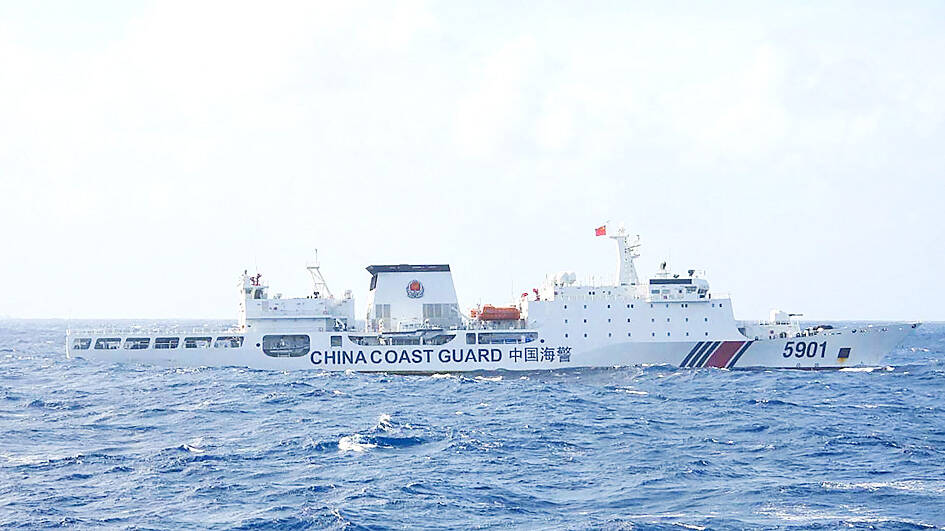The Philippines yesterday said it deployed a coast guard ship to challenge Chinese patrol boats attempting to “alter the existing status quo” of the disputed South China Sea.
Philippine Coast Guard spokesman Commodore Jay Tarriela said Chinese patrol ships had this year come as close as 60 nautical miles (111km) west of the main Philippine island of Luzon.
“Their goal is to normalize such deployments, and if these actions go unnoticed and unchallenged, it will enable them to alter the existing status quo,” he said in a statement.

Photo: Philippine Coast Guard / AFP
He later told reporters that Manila had deployed a coast guard ship to the area to challenge the “unlawful” Chinese patrols, to ensure “that this bullying behavior does not succeed.”
The China Coast Guard deployed three vessels from its Guangdong and Hainan bases to Philippine waters between Dec. 30 and Saturday, Tarriela said.
On Saturday, he said a huge Chinese coast guard ship widely known as the “Monster” had returned to its exclusive economic zone, prompting its own coast guard vessel to approach and issue a radio challenge.
The Philippine Coast Guard ship BRP Teresa Magbanua approached the 12,000-tonne Chinese patrol ship’s “starboard side at close range, effectively hindering the China Coast Guard vessel’s attempts to move” toward the coastline of the western province of Zambales, Tarriela wrote on social media.
The “Monster” replaced another vessel, CCG 3304, in the area, he said.
The Philippine Coast Guard “has consistently communicated over the radio, reminding the Chinese crew that they are unlawfully operating within the Philippines’ exclusive economic zone and do not possess any legal authority to conduct maritime patrols,” he said.
It is at least the second time this month that the Philippines has challenged the China Coast Guard vessel CCG 5901. Bigger than a US Navy destroyer, the vessel is armed with anti-aircraft guns and fuel storage capacities that allow it to undertake extended missions.
Beijing claims most of the strategic waterway despite a 2016 international tribunal ruling that went against it.
Taiwan, Brunei, Malaysia and Vietnam also have claims to the waters.
Additional reporting by Bloomberg

Thousands gathered across New Zealand yesterday to celebrate the signing of the country’s founding document and some called for an end to government policies that critics say erode the rights promised to the indigenous Maori population. As the sun rose on the dawn service at Waitangi where the Treaty of Waitangi was first signed between the British Crown and Maori chiefs in 1840, some community leaders called on the government to honor promises made 185 years ago. The call was repeated at peaceful rallies that drew several hundred people later in the day. “This government is attacking tangata whenua [indigenous people] on all

RIGHTS FEARS: A protester said Beijing would use the embassy to catch and send Hong Kongers to China, while a lawmaker said Chinese agents had threatened Britons Hundreds of demonstrators on Saturday protested at a site earmarked for Beijing’s controversial new embassy in London over human rights and security concerns. The new embassy — if approved by the British government — would be the “biggest Chinese embassy in Europe,” one lawmaker said earlier. Protester Iona Boswell, a 40-year-old social worker, said there was “no need for a mega embassy here” and that she believed it would be used to facilitate the “harassment of dissidents.” China has for several years been trying to relocate its embassy, currently in the British capital’s upmarket Marylebone district, to the sprawling historic site in the

‘IMPOSSIBLE’: The authors of the study, which was published in an environment journal, said that the findings appeared grim, but that honesty is necessary for change Holding long-term global warming to 2°C — the fallback target of the Paris climate accord — is now “impossible,” according to a new analysis published by leading scientists. Led by renowned climatologist James Hansen, the paper appears in the journal Environment: Science and Policy for Sustainable Development and concludes that Earth’s climate is more sensitive to rising greenhouse gas emissions than previously thought. Compounding the crisis, Hansen and colleagues argued, is a recent decline in sunlight-blocking aerosol pollution from the shipping industry, which had been mitigating some of the warming. An ambitious climate change scenario outlined by the UN’s climate

A deluge of disinformation about a virus called hMPV is stoking anti-China sentiment across Asia and spurring unfounded concerns of renewed lockdowns, despite experts dismissing comparisons with the COVID-19 pandemic five years ago. Agence France-Presse’s fact-checkers have debunked a slew of social media posts about the usually non-fatal respiratory disease human metapneumovirus after cases rose in China. Many of these posts claimed that people were dying and that a national emergency had been declared. Garnering tens of thousands of views, some posts recycled old footage from China’s draconian lockdowns during the COVID-19 pandemic, which originated in the country in late